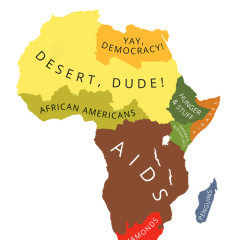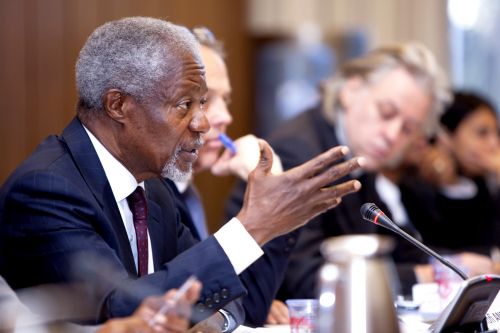A Billion Reasons to Believe in Africa: A Rethink
August 15, 2012
Dr. Mary Kinyanjui*
 “There are a billion reasons to believe in Africa,” states Coca-Cola’s new commercial that attempts to capture the spirit of “new” Africa.
Africa-optimism has in the recent past gained massive hype. Ernst & Young in its May report on Africa’s attractiveness for foreign direct investment (FDI) states that "…There is a new story emerging about Africa; a story of growth, progress, potential and profitability.” According to the African Developmental Bank, "Africa has started to see an economic resurgence" as a result of stronger demand for its commodities from emerging economies such as Brazil, China, India, and South Africa. With the continent’s middle class clocking 313 million people, the region’s consumer spending has increased. McKinsey Global Institute projects that consumer spending in Africa will reach $1.4 trillion in 2020, from about $860 million in 2008. Over 616 million people out of the 1 billion people that reside in Africa have a cellular phone. The average African drinks about 8 liters of beer per year compared to about 70 liters on average per year for Americans.
While the continent is bequeathed with flowery endearments, it must guard against falling prey to the “feel good” trap and ask fundamental questions. For example, how are the endearments changing the lot of Africa's ordinary citizen? How is Africa changing for the better? Is the renewed interest in Africa by emerging and developed economies out to improve the continent's socio-economic wellbeing? While Africa ought to embrace the old and new suitors trooping to the continent, this must be done with caution and on a win-win basis.
What happened in Malawi ought to make Africans rethink their celebration. As long as Malawi followed donor dictates and allowed multinational companies to control its agricultural sector, the country was hailed as Africa’s success story on food security. Once Malawi fell out with donors and multinational companies, the country’s food security was crippled. This begs the question: who was driving Malawi’s food security? Between Malawians and merchants of patented and re-engineered seeds and fertilizer manufacturers, who was benefitting most from the ‘success story’? Was this a Malawi success story or a multinational company success story?
As global optimism in Africa is hyped, Africa’s land is being grabbed by ‘investors.’ Investors from China and Europe are busy buying land in Kenya and putting up 'Chinese only' and 'European only' real estate. As elegant edifices mushroom in Nairobi and its environs, where is the revenue accrued heading? Won’t we wake up one day and find ourselves legally landless and at the mercy of the so called ‘investors’?What will happen twenty years from now when our children find themselves landless? Isn't this a prescription for a revolution and civil war?
Saudi Arabian investors have reportedly paid $100 million for an Ethiopian farm. Uganda has sold 2 million acres to Egypt. Kenya is leasing out 40,000 acres to Qatar. China owns vast tracts of land in Zimbabwe and Algeria. Madagascar was in the process of leasing out 1 million acres to South Korea. Millions of Africans are dying from starvation as African governments lease and sell millions of acres of land to feed populations in China, Saudi Arabia, South Korea, and Qatar among others.
Africa is busy working on internet connectivity. In fact, growth in Africa’s Internet and Broadband sector has accelerated. By December 31 2011, Africa had 139,875,242 internet users and 37,739,380 people who had subscribed to Facebook. As we consume this service, do we ever question who is controlling the internet? What would happen if the Internet Corporation for Assigned Names and Numbers (ICANN), which basically holds the keys for any person or business hoping to turn up in search results on the Internet, gave a blackout to the continent? As more computers are dumped into the continent, who is the ultimate beneficiary?
Africa, a continent that carries 25% of the world’s diseases is dependent on multinational ‘investors’ for medical supplies. It imports around 70% of its pharmaceutical needs from abroad. Two thirds of global value of pharmaceutical products are produced in 5 countries; USA, Japan, France, Germany and UK.
In the banking sector, more than half of countries in Africa have a banking market with either a dominant or a significant share of foreign-owned financial institutions.The continent spends more money servicing its debt, in other words, paying interest to outsiders, than it spends on infrastructural development.
On the natural resources front, none of the natural resources Africa is blessed with is under African control. While African countries like Nigeria, Angola, Democratic Republic of the Congo, Gabon, Libya, and Equatorial Guinea among others possess oil in abundance, they don't have the capacity to discover oil; drill for the oil; refine the oil; transport the oil to the destination where it would be refined; repair existing refineries or have the vessel to transport the oil back to Africa for consumption.
Africa should not celebrate the “...billion reasons to believe in Africa” craze while the continent is owned stock and barrel by other people. We cannot talk of a thriving economy when we are mere consumers and passive.
Before we celebrate Coke’s penetration to most parts of Africa, we ought to ask why we are dying of preventable and treatable diseases; why essential medicines cannot be accessed in African households; why we don't benefit from our rich natural resources; why we are not in control of our economies; why we are food insecure in spite of a good climate; why it is easier to fly to other continents but not our own; why intra-Africa exchange of goods and services is low and why there is no African homegrown brand that the world can celebrate.
*Source African Executive
“There are a billion reasons to believe in Africa,” states Coca-Cola’s new commercial that attempts to capture the spirit of “new” Africa.
Africa-optimism has in the recent past gained massive hype. Ernst & Young in its May report on Africa’s attractiveness for foreign direct investment (FDI) states that "…There is a new story emerging about Africa; a story of growth, progress, potential and profitability.” According to the African Developmental Bank, "Africa has started to see an economic resurgence" as a result of stronger demand for its commodities from emerging economies such as Brazil, China, India, and South Africa. With the continent’s middle class clocking 313 million people, the region’s consumer spending has increased. McKinsey Global Institute projects that consumer spending in Africa will reach $1.4 trillion in 2020, from about $860 million in 2008. Over 616 million people out of the 1 billion people that reside in Africa have a cellular phone. The average African drinks about 8 liters of beer per year compared to about 70 liters on average per year for Americans.
While the continent is bequeathed with flowery endearments, it must guard against falling prey to the “feel good” trap and ask fundamental questions. For example, how are the endearments changing the lot of Africa's ordinary citizen? How is Africa changing for the better? Is the renewed interest in Africa by emerging and developed economies out to improve the continent's socio-economic wellbeing? While Africa ought to embrace the old and new suitors trooping to the continent, this must be done with caution and on a win-win basis.
What happened in Malawi ought to make Africans rethink their celebration. As long as Malawi followed donor dictates and allowed multinational companies to control its agricultural sector, the country was hailed as Africa’s success story on food security. Once Malawi fell out with donors and multinational companies, the country’s food security was crippled. This begs the question: who was driving Malawi’s food security? Between Malawians and merchants of patented and re-engineered seeds and fertilizer manufacturers, who was benefitting most from the ‘success story’? Was this a Malawi success story or a multinational company success story?
As global optimism in Africa is hyped, Africa’s land is being grabbed by ‘investors.’ Investors from China and Europe are busy buying land in Kenya and putting up 'Chinese only' and 'European only' real estate. As elegant edifices mushroom in Nairobi and its environs, where is the revenue accrued heading? Won’t we wake up one day and find ourselves legally landless and at the mercy of the so called ‘investors’?What will happen twenty years from now when our children find themselves landless? Isn't this a prescription for a revolution and civil war?
Saudi Arabian investors have reportedly paid $100 million for an Ethiopian farm. Uganda has sold 2 million acres to Egypt. Kenya is leasing out 40,000 acres to Qatar. China owns vast tracts of land in Zimbabwe and Algeria. Madagascar was in the process of leasing out 1 million acres to South Korea. Millions of Africans are dying from starvation as African governments lease and sell millions of acres of land to feed populations in China, Saudi Arabia, South Korea, and Qatar among others.
Africa is busy working on internet connectivity. In fact, growth in Africa’s Internet and Broadband sector has accelerated. By December 31 2011, Africa had 139,875,242 internet users and 37,739,380 people who had subscribed to Facebook. As we consume this service, do we ever question who is controlling the internet? What would happen if the Internet Corporation for Assigned Names and Numbers (ICANN), which basically holds the keys for any person or business hoping to turn up in search results on the Internet, gave a blackout to the continent? As more computers are dumped into the continent, who is the ultimate beneficiary?
Africa, a continent that carries 25% of the world’s diseases is dependent on multinational ‘investors’ for medical supplies. It imports around 70% of its pharmaceutical needs from abroad. Two thirds of global value of pharmaceutical products are produced in 5 countries; USA, Japan, France, Germany and UK.
In the banking sector, more than half of countries in Africa have a banking market with either a dominant or a significant share of foreign-owned financial institutions.The continent spends more money servicing its debt, in other words, paying interest to outsiders, than it spends on infrastructural development.
On the natural resources front, none of the natural resources Africa is blessed with is under African control. While African countries like Nigeria, Angola, Democratic Republic of the Congo, Gabon, Libya, and Equatorial Guinea among others possess oil in abundance, they don't have the capacity to discover oil; drill for the oil; refine the oil; transport the oil to the destination where it would be refined; repair existing refineries or have the vessel to transport the oil back to Africa for consumption.
Africa should not celebrate the “...billion reasons to believe in Africa” craze while the continent is owned stock and barrel by other people. We cannot talk of a thriving economy when we are mere consumers and passive.
Before we celebrate Coke’s penetration to most parts of Africa, we ought to ask why we are dying of preventable and treatable diseases; why essential medicines cannot be accessed in African households; why we don't benefit from our rich natural resources; why we are not in control of our economies; why we are food insecure in spite of a good climate; why it is easier to fly to other continents but not our own; why intra-Africa exchange of goods and services is low and why there is no African homegrown brand that the world can celebrate.
*Source African Executive




























